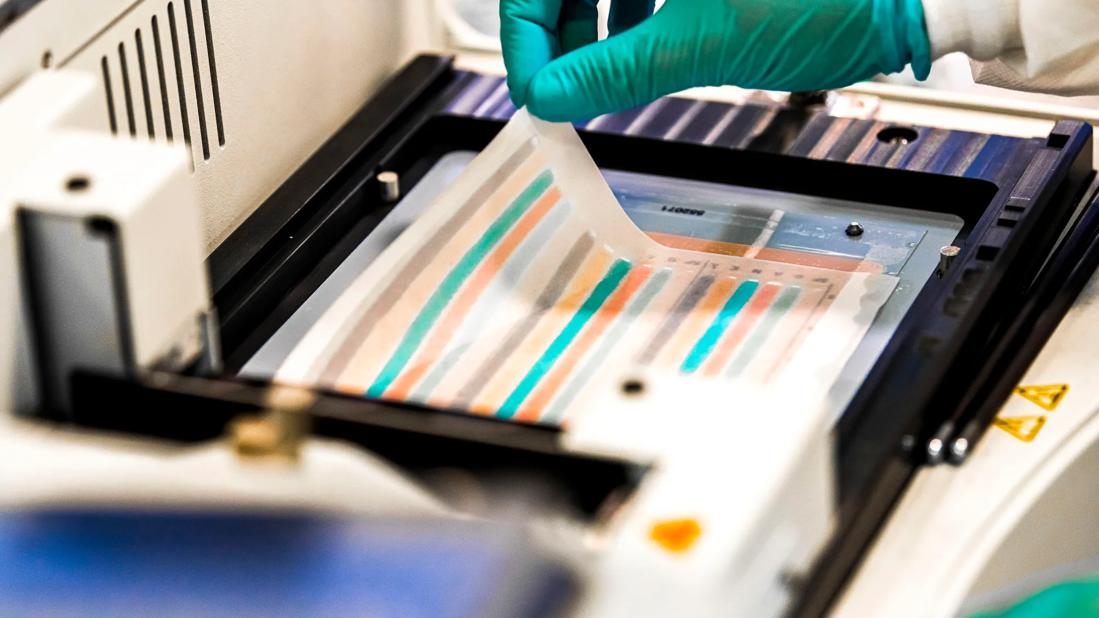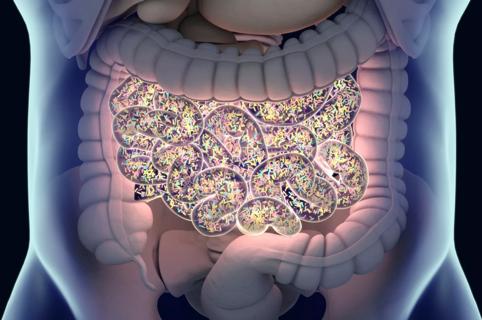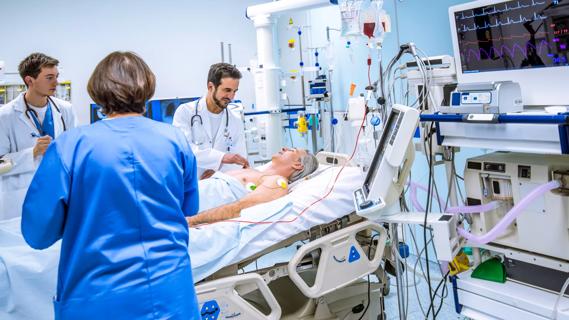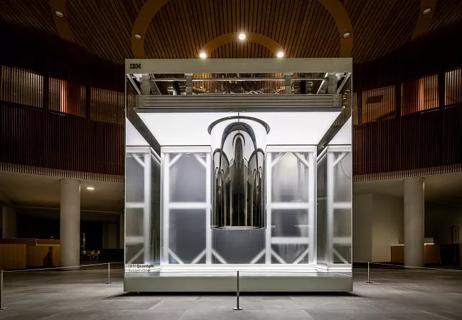Meet the Director of Cleveland Clinic’s new Center for Immunotherapy and Precision Immuno-Oncology

Cleveland Clinic’s new Center for Immunotherapy and Precision Immuno-Oncology, directed by renowned cancer researcher Timothy Chan, MD, PhD, plans to unite researchers in multiple disciplines to advance personalized cancer care and develop novel immune system-based treatments.
Advertisement
Cleveland Clinic is a non-profit academic medical center. Advertising on our site helps support our mission. We do not endorse non-Cleveland Clinic products or services. Policy
“In the last seven or eight years, immunotherapy has arisen as one of the main pillars of cancer therapy,” says Dr. Chan, who joined Cleveland Clinic in April 2020 from Memorial Sloan Kettering Cancer Center and Weill Cornell School of Medicine. “Moreover, new immunotherapy agents are transforming other types of care, such as for autoimmune disorders and infectious disease.
“Our new center resides in both the research and the therapeutic realms,” he says. “The plan is to build a state-of-the-art, enterprise-level organization to discover, as well as to bring into the clinic, new immunotherapies. We’re focusing on big data — on experimental therapeutics, driven by genomic analysis and high-throughput immunoprofiling — and we’re leveraging all the strengths of the Cleveland Clinic enterprise to do this. I’m ecstatic to be here.”
“Innovation in precision immunotherapy is one of the most exciting areas in cancer research,” says Taussig Cancer Institute Chairman Brian J. Bolwell, MD. “The addition of Dr. Chan and the new center’s focus on research and clinical trials will strengthen our ability to provide advanced treatment options for our patients.”
Dr. Chan is an international expert in precision immuno-oncology and a pioneer in using genomics to determine patients’ response to immunotherapies. His lab at Memorial Sloan Kettering (MSK) made foundational discoveries, including the finding that immune checkpoint inhibitors ultimately target somatic mutations. This has led to a global effort to understand and use neoantigens in cancer therapies. It also spurred the development of a new generation of cancer vaccines aimed at unleashing the immune system against mutations in tumors. At MSK, he ran a successful cooperative center, the Immunogenomics and Precision Oncology Platform, that propelled translational immunology research and trial work.
Advertisement
Dr. Chan has published more than 200 peer-reviewed articles and has made landmark discoveries in his field, such as how immune checkpoint therapies work in patients, how immunotherapies alter tumors during treatment, and how individual genes enable certain patients to benefit more from immunotherapy. He has received numerous awards, including the National Cancer Institute Outstanding Investigator Award in 2018.
In addition to directing the new center, Dr. Chan will hold staff positions in the Lerner Research Institute’s Genomic Medicine Institute and the Taussig Cancer Institute’s Department of Radiation Oncology. He joins the leadership of the National Center for Regenerative Medicine at Case Western Reserve University as Co-Director, with Stanton Gerson, MD. Dr. Chan also will collaborate with experts in Cleveland Clinic’s new Center for Global and Emerging Pathogens Research, which is focused on broadening understanding of immunology and microbial pathogenesis with the goal of improving treatment for a variety of diseases, including virus-induced cancers.
He earned his MD and PhD in genetics from Johns Hopkins University, where he completed a residency in radiation oncology and a postdoctoral fellowship in tumor biology. He is board-certified in radiation oncology and is an elected member of the Association of American Physicians.
In a wide-ranging conversation with Consult QD, Dr. Chan discusses his research, immunotherapy’s progress and potential, and his goals for the new center.
Advertisement
How did you become interested in cancer genomics and immuno-oncology?
Dr. Chan: At Johns Hopkins, where I did my MD/PhD work, I trained as a cancer geneticist, with Bert Vogelstein and others. Even though it wasn’t fully appreciated yet that the immune system plays a major role in facilitating treatment response as well as control of tumors, there was still a lot of research by people I knew there that really piqued my interest, including Drew Pardoll and Lieping Chen, whose work has really revolutionized the field of immunotherapy.
When I moved to Memorial Sloan Kettering, Jim Allison, whose lab was upstairs, and others had been developing the concept of immune checkpoint blockade. Back then, nobody had any idea that cancer genetics was linked to immunotherapy. Ipilimumab, one of the first foundational immune checkpoint blockade agents, had just come on the scene. There was a lot of skepticism about the whole concept. It was thought that there was something wrong with the immune cells themselves. Our group worked with investigators developing the first immune checkpoint agents and formulated a collaboration to try to understand how immunotherapy works, and how to use this knowledge to develop new and better therapies.
The first discovery that came from our group was that it was really the cancer-specific mutations that the immune system saw and targeted when a patient got the drug to reawaken the immune system. The mutations necessary for cancer cells to proliferate cause the cancer cells themselves to appear foreign. And that’s what the immune system is all about — identifying what is foreign to the body and eliminating it. So that was a fundamental link. The mutations themselves are the targets for immunotherapy. Therefore, the more mutations a tumor has, the better one does. This concept has become fundamental in the field and contributed to the first pan-cancer FDA approval of a drug: the approval of anti-PD1 for mismatch repair-deficient tumors.
Advertisement
That concept seems so basic now.
Dr. Chan: It was highly controversial at the time. It took a while for people to get comfortable with the idea.
The idea that cancer varies from individual to individual?
Dr. Chan: That, and that the mutation profile itself was determining the response of immunotherapy agents. I’m particularly proud that this concept has led to worldwide efforts to find smarter and better targets for cell therapy, CAR T-cells, vaccines, all sorts of things. A very good friend of mine, Luis Diaz, ran a clinical trial that showed that cancers with high mutation burdens due to mismatch repair deficiencies responded well to immunotherapy. That led to the very first FDA approval of an anticancer agent [pembrolizumab] based on a cancer’s specific genetic profile and not the site where the tumor originates. That fundamentally changes how we think about things and potentially how the FDA will move forward in approving drugs.
The amount of individual variation in cancer patients’ tumors suggests that combinations of immunotherapy agents are the path forward.
Dr. Chan: I totally agree. And that’s a good segue into some of the things that we’re going to do in the Center for Immunotherapy and Precision Immuno-Oncology. We want to use big data to rationally design next-generation combination therapies. Some of the things that we’re doing already, based on this concept, have pushed response rates for hard-to-treat cancers like renal cell carcinoma to about 70% to 80% with the right immunotherapy combinations. I’ve been treating patients for a long time, and to see response rates that were stuck at 1%-2% go beyond 70% is unbelievable.
Advertisement
Are those response rates durable?
Dr. Chan: Yes. And I think this is just the tip of the iceberg. Using big data and identifying the new sets of rules that regulate and define success in this new family of therapies that involve the immune system are critical. With the advent of high-throughput immunoprofiling capabilities, we can really understand what drug combinations to use. This will ultimately be helpful for patients in clinical trials because the chances of something working are going to be much greater and patients will benefit even in early-phase trials. It will also save a lot of resources and allow us to accurately and efficiently design large phase III confirmatory trials.
If you’re doing true precision immuno-oncology, with individually tailored treatments, how do you test that?
Dr. Chan: Cancers have multiple levels of differences and similarities. At the fundamental level, Patient A’s cancer may have different mutations than Patient B’s cancer. But when you move a bit broader, there are commonalities like high mutation burden or hypermethylation that can be targeted and used to design molecular-based trials, such as basket trials. A further step is an N of 1 trial design, where one can profile an individual patient and use algorithms to determine what the targeted lesions are likely to be susceptible to.
Enterprise-level cancer profiling enables the application of this philosophy — that every patient’s tumor may be different, but there may be certain combinations of mutations that enable effective targeting. Identifying these immunotherapy targets is one of the most active fields in cancer research. It takes a team: people running clinical trials, computational engineers, bioinformaticians, experimental immunologists. There are a lot of very talented people here at the Taussig Cancer Institute and the Lerner Research Institute, the Robert J. Tomisch Pathology & Laboratory Medicine Institute, and all across Cleveland Clinic. The reason I was excited to come here is because the foundation for a highly impactful translational enterprise for immunotherapy is already here.
Did the international scale of Cleveland Clinic’s health system factor into your decision to relocate?
Dr. Chan: I think the footprint Cleveland Clinic has established, being a global enterprise, allows immunotherapy development to operate at a much higher level. We’re realizing, for instance, that people around the globe have different responses to treatment, and the utility of immunotherapy may vary in different places. There’s global variation, not only in cancer but in infectious diseases. We have the opportunity to conduct clinical trials, develop therapies and improve the understanding of immuno-oncology. We want patients throughout the Cleveland Clinic system to have access to these clinical trials, to be able to get their mutations profiles, and for tailored therapies to be available based on these data. The goal is to enhance immunotherapy capability at all of our different sites, so patients in each part of the world can benefit. We have opportunities to make an impact not just in cancer treatment, but in other areas such as long-term rejection in organ transplant. Cleveland Clinic is one of the largest organ transplant centers in the world. It’s a great place to tackle these questions.
Will the center recruit additional researchers as well as work with existing ones?
Dr. Chan: Yes. For example, we have a mandate to recruit folks who can help develop the next generation of engineered CAR T-cells, going beyond CD 19 — finding new targets, more accurate targets, for solid tumors, for instance. This will be in collaboration with the Case Comprehensive Cancer Center, which has a state-of-the-art GMP-compliant cellular therapy manufacturing facility with six cleanrooms. There are very few like it in the United States in academic institutions. This will be a perfect seed to begin to develop new agents here that will eventually go for IND [investigational new drug] status.
You’ve mentioned checkpoint inhibitors and engineered T-cells. What about cancer vaccines? Will that be a research priority?
Dr. Chan: The major focus of our immunotherapy efforts is vaccine development. This is something we’re really going to encourage and work on collaboratively … to build a cancer vaccine program at Cleveland Clinic. The vaccine world has undergone monumental shifts. In the past, people were largely targeting proteins that were expressed throughout the body, and in the absence of immune checkpoint blockade, there was a lot of tolerance. That’s why for decades cancer vaccines have really not advanced. Partly as a result of our initial findings that tumor mutations are the targets of immunotherapy, the focus of cancer vaccines is now shifting to target neoantigens – these mutations that develop that are foreign to the body.
As a radiation oncologist, you’re caring for cancer patients as well as conducting research. Why do you do both?
Dr. Chan: I’ll be seeing brain cancer patients and am very much looking forward to working with my colleagues in the Rose Ella Burkhardt Brain Tumor & Neuro-Oncology Center. Depending on the type of brain tumor, you can make a big difference. Some are curable, and there’s a lot of joy in that. Taking part in clinical activity is critical for translational research, which is what we’re all about. It pushes you to keep up with clinical literature, with what’s happening in the clinical trial space, because your patients are depending on it. I cannot ever see myself not seeing patients.
Considering the rapid pace of recent progress in immunotherapy and precision immuno-oncology, where do you expect the field will be in 10 or 20 years?
Dr. Chan: My dream is that we no longer need the center – that we can cure cancers, or at least extend patients’ lives, by making cancer a chronic illness. But I think I would be happy if we were able to control several more diseases, if we were able to identify new therapeutic combinations and modalities that help push understanding forward. If our efforts allow patients to respond better to current and new immunotherapies and experience deep disease remission, so that a parent can see their child graduate from college or another can meet their new grandchild when previously that would have been impossible, I would call that a success.
Advertisement

First full characterization of kidney microbiome unlocks potential to prevent kidney stones

Researchers identify potential path to retaining chemo sensitivity

Large-scale joint study links elevated TMAO blood levels and chronic kidney disease risk over time

Investigators are developing a deep learning model to predict health outcomes in ICUs.

Preclinical work promises large-scale data with minimal bias to inform development of clinical tests

Cleveland Clinic researchers pursue answers on basic science and clinical fronts

Study suggests sex-specific pathways show potential for sex-specific therapeutic approaches

Cleveland Clinic launches Quantum Innovation Catalyzer Program to help start-up companies access advanced research technology